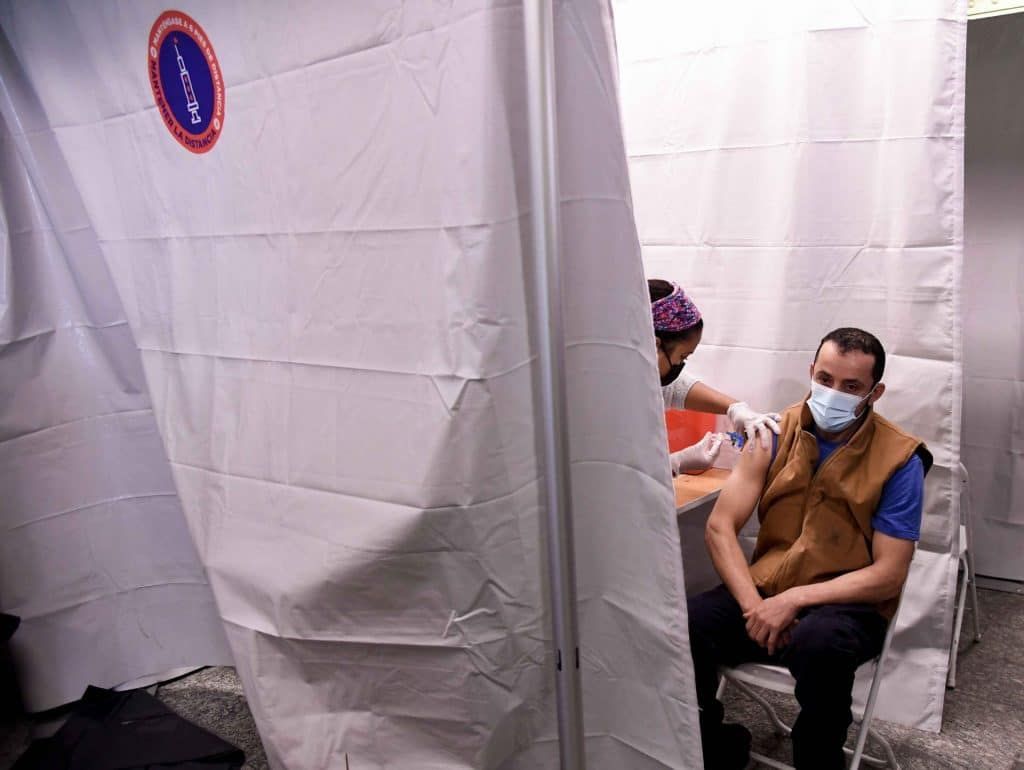Why are COVID-19 vaccine booster shots controversial?
By Matt Field | August 12, 2021
 A man receives a COVID-19 vaccine in New York. Credit: Marc A. Hermann / MTA. CC BY 2.0.
A man receives a COVID-19 vaccine in New York. Credit: Marc A. Hermann / MTA. CC BY 2.0.
When the drugmaker Pfizer began a full-court press last month to get the US government to authorize COVID-19 vaccine booster shots, saying vaccine efficacy was fading after six months, US regulators and health officials balked. Federal agencies released a dry statement about the fully vaccinated not needing extra shots “at this time.” But other countries began to move forward, judging that research suggesting waning protection from the vaccines necessitated giving further shots to some in their populations. The United States is now behind places like Israel, which is already providing booster shots, but US officials are traveling down the same road as other wealthy countries: boosters are coming.
Many experts say the coronavirus vaccines still offer strong protection, even months after people started getting inoculated and even in the face of the more transmissible delta variant of SARS-CoV-2, the virus that causes COVID-19. While breakthrough infections are making headlines, the vaccines are still keeping many people from dying or ending up in the hospital.
The US Food and Drug Administration authorized booster shots on August 12 for immunocompromised people, meaning people like organ transplant recipients who may never have mounted a strong immune response to the vaccines in the first place could soon get third shots. One study found that immunized transplant recipients were 485 times more likely to be hospitalized and die after a breakthrough case of COVID-19 than the general population, and another found that they may benefit from boosters.
But the US government likely won’t stop at boosters for the immunocompromised. Media reports suggest the Biden administration will detail a booster plan in September. But do people need the shots? If so, what kind? And will people getting third shots be taking someone else’s first?
Do we need booster shots?
While the news is plastered with reports of breakthrough infections, where vaccinated people test positive for COVID-19, evidence suggests vaccinated people aren’t filling up hospital wards or dying. A recent Kaiser Family Foundation analysis found that in 23 states and Washington, DC, nine out of 10 infections, hospitalizations and deaths were among people who were unvaccinated or not yet fully vaccinated. According to officials like Anthony Fauci, the government’s top infectious disease expert, COVID-19 remains a “pandemic among the unvaccinated.”
Confused about the news on vaccines and delta?
Here's what we know
Vaccines prevent 75-85% of symptomatic infections
Vaccines prevent 90-98% of hospitalizations, deaths
Vaccines reduce transmission. By a lot. Don't know precisely how much — but a lot
Can't ask for much more
— Ashish K. Jha, MD, MPH (@ashishkjha) August 11, 2021
But many experts see vaccine boosters as necessary at some point. For example, an Israeli report and a not yet peer-reviewed study by Mayo Clinic researchers and others suggest vaccine efficacy is trending down.
“Sooner or later you’re going to see an attenuation to the point where we’re going to have to give an additional boost to people, very likely the elderly, before you give it to otherwise normal people who are not old,” Fauci, the director of the National Institute of Allergy and Infectious Diseases, told Meet the Press host Chuck Todd on August 8.
What kind of shot will it be?
The Food and Drug Administration will reportedly authorize a third dose of the current Pfizer or Moderna vaccines for the immunocompromised. Future shots could include updated vaccines against variants such as delta. Vaccine makers have said they are developing and testing formulations against the beta variant first identified in South Africa, and Pfizer announced that it would begin testing a delta specific vaccine this month.
Why is the idea of boosters so controversial?
Huge swaths of the world remain even more vulnerable to delta than the highly vaccinated United States. Take Nigeria, a country with more than 200 million people or Ethiopia, which has a population of more than 100 million. They’ve each administered two doses of vaccine per hundred people for a combined total of over 6 million shots, according to The New York Times. Meanwhile, the United States, with a slightly bigger population of 330 million people has given 106 shots per 100 people for a total of more than 350 million shots.
Some argue that it’s not fair that wealthier countries are seeking even higher levels of protection against COVID-19 when the rest of the world hasn’t even given first or second doses to many in their populations.
“I understand the concern of all governments to protect their people from the delta variant, but we cannot accept countries that have already used most of the global supply of vaccines using even more of it, while the world’s most vulnerable people remain unprotected,” World Health Organization head Tedros Adhanom Ghebreyesus said on August 4.
According to Tedros, 80 percent of the 4 billion COVID-19 vaccine doses world governments have administered have gone to wealthier countries, where less than half the world’s population lives.
While Tedros called for a moratorium on booster doses, White House Press Secretary Jen Psaki called the boosters versus equitable distribution argument a “false choice,” saying the United States has donated 110 million doses of vaccine, more than any other country combined.
Is there enough vaccine for boosters?
Not so many months ago, getting a COVID-19 vaccine shot in the United States was no easy thing and required waiting, in some cases for months, just to become eligible to book hard-to-come-by appointments. The situation now is different, and the administration, local health departments, and state and local governments are trotting out celebrities, clever ad campaigns, and cash prizes to persuade people to roll up their sleeves for a dose from their ample supplies.
The White House says that if the Food and Drug Administration, which authorizes vaccine regimens, were to green-light booster shots in the future, the country would have the necessary doses. “That is why we ordered the number of doses we did order several months ago, because we are like Boy Scouts and Girl Scouts and always want to be prepared,” White House Press Secretary Jen Psaki told reporters on August 4.
It’s difficult to gauge exactly how many doses the administration has on hand. The Health and Human Services Department didn’t respond to a request for comment. So far more than 408 million doses have been delivered around the country, according to the Centers for Disease Control and Prevention. From press releases and news reports, it appears the federal government has procured at least 1 billion doses of the three authorized vaccines—that’s in addition to the 500 million doses Biden announced the United States would buy from Pfizer and donate to other countries. In February, the administration announced that a total of 600 million doses of the two-shot Pfizer and Moderna vaccines had been ordered. Then authorities ordered another 200 million doses from Moderna. In addition, in March, the government brought the total order of the one-shot Johnson & Johnson vaccine to 200 million doses.
Together, we make the world safer.
The Bulletin elevates expert voices above the noise. But as an independent nonprofit organization, our operations depend on the support of readers like you. Help us continue to deliver quality journalism that holds leaders accountable. Your support of our work at any level is important. In return, we promise our coverage will be understandable, influential, vigilant, solution-oriented, and fair-minded. Together we can make a difference.
Keywords: Coronavirus, booster shots, vaccines
Topics: Analysis
















The benefits of a booster dose for all people far outweigh the risks. In the event a vaccinated person develops a breakthrough Covid infection, there are insufficient beds, staff, resources and ICU beds to provide supportive care. A Booster dose mitigates these difficulties.
The White House press secretay is wrong. While COVID-19 vaccines remain in short supply around the world, boosters versus equitable distribution is a very real choice. If wealthy countries wish to put this pandemic in the rear view mirror, then they better make sure all frontline health workers and vulnerable populations the world over get their first and second shots before considering boosters for anyone. Besides, the evidence isn’t in yet on the need for booster and ‘trust in science’ is in the balance if decisions are made that are not based on scientific evidence.
Some Israeli doctors, facing serious vaccine “breakthrough” problem–i.e. that 60% of all “gravely ill” Covid patients in Israel are fully vaccinated– are madly giving “boosters” to everyone but one doctor says that “boosters ” are not the solution. https://www.sciencemag.org/news/2021/08/grim-warning-israel-vaccination-blunts-does-not-defeat-delta